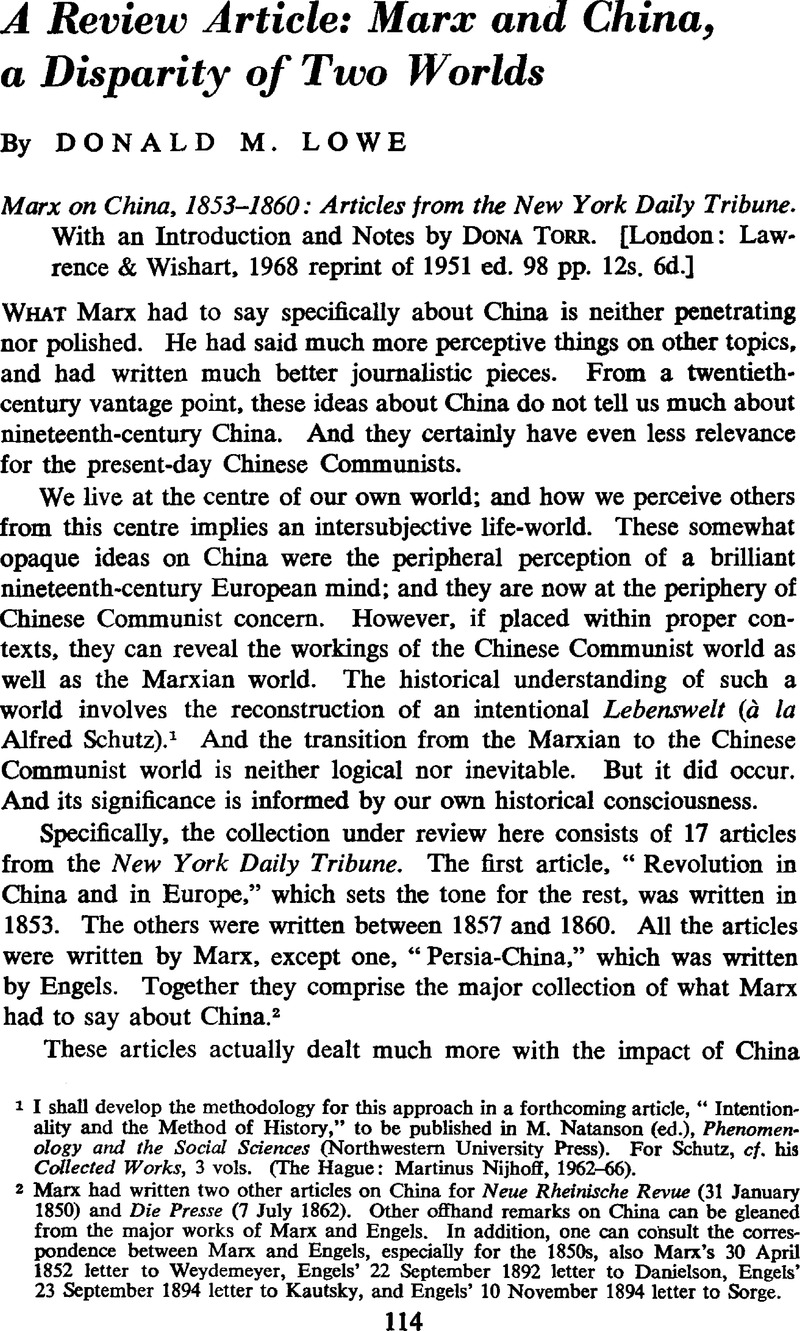No CrossRef data available.
Published online by Cambridge University Press: 17 February 2009

1 I shall develop the methodology for this approach in a forthcoming article, “Intentionality and the Method of History,” to be published in Natanson, M. (ed.), Phenomenology and the Social Sciences (Northwestern University Press)Google Scholar. For Schutz, cf. his Collected Works, 3 vols. (The Hague: Martinus Nijhoff, 1962–66).Google Scholar
2 Marx had written two other articles on China for Neue Rheinische Revue (31 01 1850)Google Scholar and Die Presse (7 07 1862). Other offhand remarks on China can be gleaned from the major works of Marx and Engels. In addition, one can consult the correspondence between Marx and Engels, especially for the 1850s, also Marx's 30 April 1852 letter to Weydemeyer, Engels' 22 September 1892 letter to Danielson, Engels' 23 September 1894 letter to Kautsky, and Engels' 10 November 1894 letter to Sorge.Google Scholar
3 Marx's, idea of Chinese economy must be distinguished from his idea of Indian economy. In “The British Rule in India,” New York Daily Tribune (25 06 1853), he mentioned the absence of private landowning and the governmental control of waterworks, as the bases for Oriental despotism. However, neither of these two was mentioned in connexion with the Chinese economy.Google Scholar
4 For the concept of intentional consciousness, cf. Gurwitsch, A., “Husserl's Theory of the Intentionality of Consciousness in Historical Perspective,” in Lee, R. N. and Mandelbaum, M (eds.), Phenomenology and Existentialism (Baltimore: Johns Hopkins Press, 1967).Google Scholar
5 It is a Lebenswelt not a Weltanschauung, because the former presupposes an intentional centre for the intersubjective life-world, whereas the latter presupposes an immanent Hegelian dialectical system. The epistemic foundation for the former is phenomenological, whereas for the latter it is idealistic.Google Scholar
6 Cf. Kosik, K., “The Individual and History,” in Lobkowicz, N. (ed.), Marxism and the Western World (South Bend; University of Notre Dame Press, 1967)Google Scholar, and Sartre, J.-P., Critique de la raison dialectique, Vol. I (Paris: Librairie Gallimard, 1960)Google Scholar. The prefatory essay in Sartre's work has been translated as Search for a Method by Barnes, Hazel E. (New York: Vintage Book, 1968).Google Scholar
7 I am arguing for a method of intellectual history not as the history of ideas, but as a phenomenological clarification of perspectives. Ideas are not discrete entities, having autonomous careers. They are always thought by someone within a context. The relation between thinker, thinking and thought is an intentional one.Google Scholar
8 Cf. Une Etude de l'education physique, tr. and ed. Schram, S. (Paris: Mouton, 1962). In 1938, Mao said: “We should not study the words of Marxist-Leninist theory, but study their standpoint and approach in viewing problems and solving them.”Google ScholarMao, Tse-tung, Lun hsin chieh-tuan ([Yenan], 1942 reprint of 1938 ed.), p. 101.Google Scholar In 1942, Mao said: “The target is the Chinese Revolution, the arrow is Marxism-Leninism. We Chinese Communists seek this arrow for no other purpose than to hit the target of the Chinese Revolution and the Revolution of the East.” Mao, Tse-tunget al., Kai-tsao hsüeh-hsi (n.p., [1943]), p. 26.Google Scholar Both of these quoted passages were modified in the official selected works of Mao. Cf. Mao Tse-tung hsuan-chi (1951 ed.) (Peking, 1951ff.), Vol. II, p. 521 and Vol. III, p. 801.Google Scholar
9 Mao, himself first attempted this in his “The Chinese Revolution and the CCP” (1939).Google Scholar For the full implication of this historiographical endeavour in Communist China cf. Feuerwerker, A. (ed.), History in Communist China (Cambridge, Mass.: M.I.T. Press, 1968).Google Scholar
10 I am making a distinction between meaning in history and historical significance. This distinction resembles, to some extent, Levenson's, J. R. distinction between historical significance and historical significance, in his Confucian China and Its Modern Fate, Vol. III (Berkeley & Los Angeles: University of California Press, 1965).Google Scholar
11 For the concept of institutionalization, cf. Berger, P. L. and Luckmann, T., The Social Construction of Reality (New York: Doubleday, 1966).Google Scholar
12 Jacques, Ellul, The Technological Society, tr. Wilkinson, J. (New York: Vintage Book, n.d.), p. xxv.Google Scholar